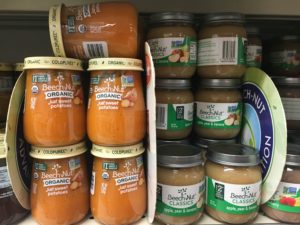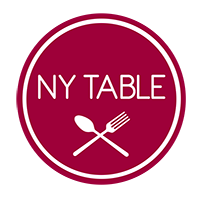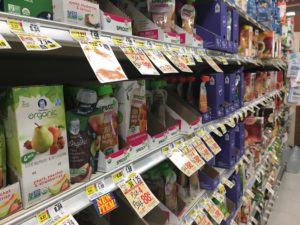If you walk into Pilotworks Brooklyn, a sprawling industrial kitchen in Williamsburg, on a Saturday, you’ll likely find a team of chefs from Smushed Organics steaming and pureeing mixtures of fruits and vegetables. The group convenes at Pilotworks to prep, cook and jar fresh organic food before delivering it to households in New York and New Jersey. More than 100 food startups, ranging from ice cream to Malaysian food, work in this shared kitchen, but as a purveyor of organic baby food, Smushed is looking to impress a much younger and pickier audience.
The company is the brainchild of co-founders Leigh Cole and her husband, Ron Vinluan. The couple launched Smushed in February of last year and currently offer two meal plans — a $36 plan that comes with six jars of food, or a $62 meal plan that comes with 12 jars. The menu changes weekly, and options range from typical ingredients like sweet potato and apple, to more adventurous selections like kale and quinoa, all of which is cooked in Brooklyn the day before delivery. Cole, who is pregnant with her first child, said the couple was inspired to create food they would want to feed their newborn.
“There was organic food that is on the shelf and it is usually older than your baby,” she said.
As Cole and Vinluan build their business, they face stiff competition from an ever more crowded market of companies peddling what’s considered to be healthier baby food. Doctors are still unsure if there is any benefit to eating organic versus non-organic foods, so much of the hype surrounding the organic industry may be just that —hype. But Cole thinks choosing organic food that is free of pesticides and chemicals is a no-brainer.
“If I’m a parent feeding my baby, why not choose the one that has less chemicals?” she said.
Cole isn’t alone. A 2015 report from Nielsen found that sales in the organic baby food sector increased by 26 percent globally between 2013 and 2015, while non-organic products declined by six percent. A survey conducted by the National Organic Trade Association found that baby food was a top category where people actively chose to purchase organic. There is also plenty of opportunity for additional expansion; the firm Zion Market Research estimates the global baby food market will reach $76.48 billion by 2021.
In the past five years, there has been a boom in organic baby food startups with the launch of companies including Yumi, Nurture Life, Once Upon a Farm and Little Spoon. TechCrunch, a technology news website, dubbed the expansion the “organic baby food wars” noting that baby food sellers were facing increased competition from new startups, but also bigger companies like Plum Organics and Beech Nut. Many of these new companies, including Smushed, operate under a delivery and subscription model, bypassing the grocery store and delivering directly to the consumer.
While organic baby food may be popular, it isn’t necessarily healthier, said pediatric nutritionist Nicole Silber. Although certified organic food is free of pesticides, antibiotics and hormones, the jury is still out on whether this makes a difference for children’s health.
“There really hasn’t been, according to the FDA, really strong research that there is any danger to consuming conventional food that has pesticide residue in it,” she said.
Silber said parents should pay attention to the ingredients listed on the package, regardless of whether the baby food is organic. Many commercial baby foods are made with fruit which has a high sugar content.
“If your baby is only consuming commercial baby food and you’re not reading the labels carefully they could be having too much sugar in their diet,” she said.

Beech-Nut organic baby food and Beech-Nut classic baby food, side by side on a grocery shelf. Photo: Caroline Hroncich
But one potential benefit to purchasing organic baby food, Silber noted, is that certified organic companies pay attention to the kinds of ingredients they put in their food.
“I think companies that do go the extra mile and get the organic certification, have more transparency to their cooking process,” she said.
For Amanda Griffin, 30, knowing the ingredients in her six month old son’s food was a priority. She thinks it’s important for the first few foods he eats to be as natural as possible.
“I really wanted something as true to real table food as I could get,” she said.
Griffin has tried baby food from a variety of companies, but her favorite is Beech-Nut Organics. She thinks that organic brands taste better than their non-organic counterparts, though she’s skeptical about the nutritional value.
“I grew up in a house where, you know, ‘what is organic?’ And we turned out fine,” she said.
Although Griffin is generally satisfied with the organic baby food she’s tried, her one complaint is that it can be costly. Even grocery store brands can easily run $20–30 for a week’s worth of meals. A 10-pack of Beech-Nut Organic baby food runs around $13 on the popular shopping website Jet, compared with a non-organic 10-pack of Beech-Nut Classics for around $7, just over half as much. The difference doesn’t stop Griffin.
“Everything about having a baby is expensive,” she said. “Worth it, but expensive.”
Growing a business is also expensive and Smushed Organics is just getting started. Cole said they are exploring new ways to ship their baby food and there’s talk of expanding to other states on the east coast. But for now they’re focused on getting ready for the arrival of their own baby. Cole said that starting Smushed Organics has taught her a lot about the different fruits, vegetables and grains that you can feed a child. They’re hoping to bring some excitement back into baby food, not only for their child, but for other people as well.
“Being excited by food and excited by vegetables, and not afraid of something that’s green,” she said. “That’s really the perspective I think we’re coming from with Smushed.”
Tags: baby food, business, healthy, new york, organic

Your Comments